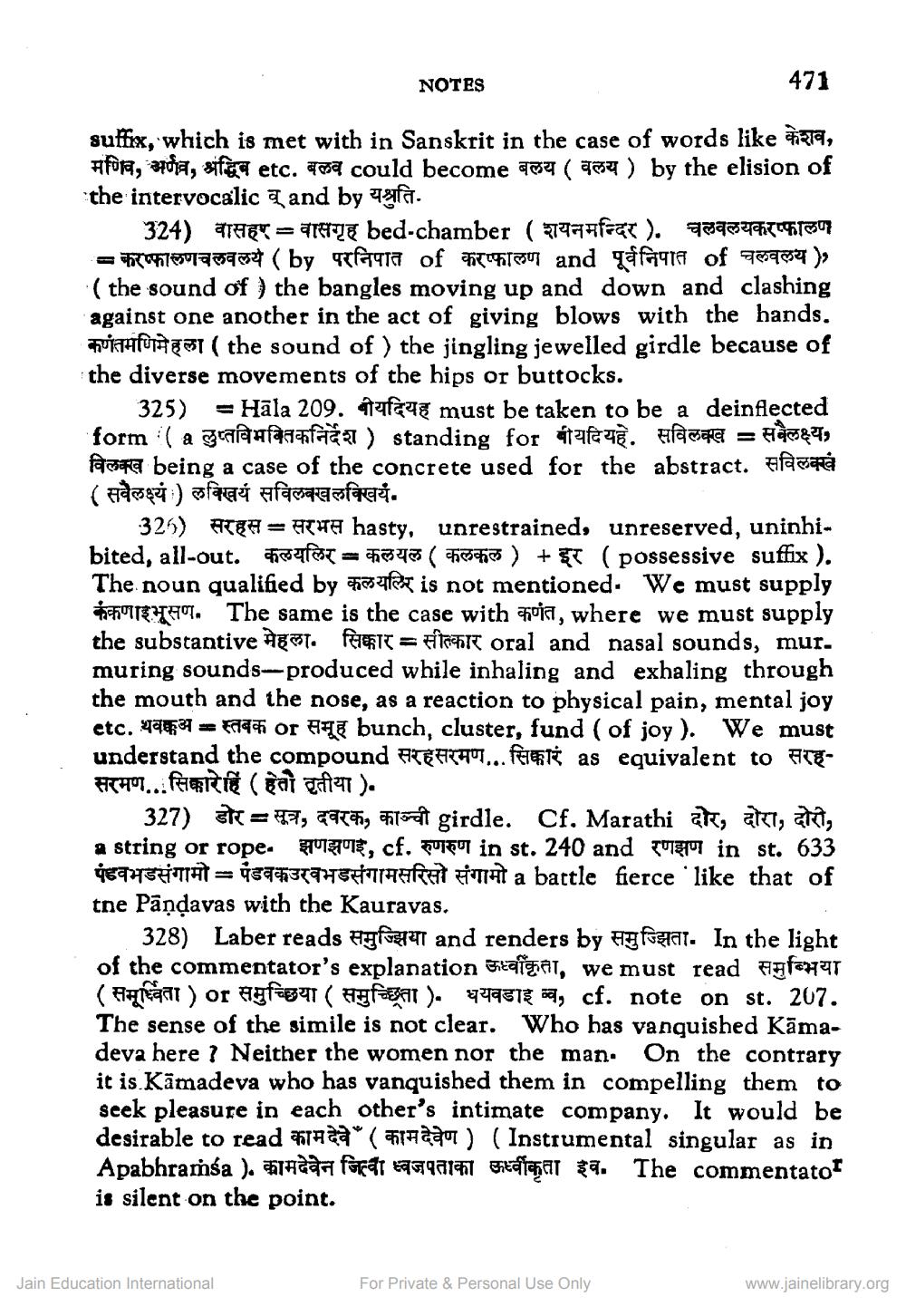________________
NOTES
471
suffix, which is met with in Sanskrit in the case of words like केशव, मणिव, अर्णव, अद्धिव etc. बलव could become बलय ( वलय) by the elision of the intervocalic c and by यश्रुति.
324) वासहर = वासगृह bed-chamber ( शयनमन्दिर ). चलवलयकरप्फालण = करप्फालणचलवलये ( by परनिपात of करप्फालण and पूर्वनिपात of चलवलय), ( the sound of the bangles moving up and down and clashing against one another in the act of giving blows with the hands. कणंतमणिमेहला ( the sound of ) the jingling jewelled girdle because of the diverse movements of the hips or buttocks.
325) = Hala 209. बीयदियह must be taken to be a deinflected form ( a लुप्तविभक्तिकनिर्देश ) standing for बीयदि यहे. सविलक्ख = सबैलक्ष्य, विलक्ख being a case of the concrete used for the abstract. सविलक्ख ( सवेलक्ष्य) लक्खियं सविलक्खलक्खियं.
326) सरहस = सरभस hasty, unrestrained, unreserved, uninhibited, all-out. कलयलिर = कलयल ( कलकल) + इर (possessive suffix). The noun qualified by fault is not mentioned. We must supply कंकणाइभूसण. The same is the case with कणंत, where we must supply the substantive मेहला. सिकार = सीत्कार oral and nasal sounds, mur. muring sounds-produced while inhaling and exhaling through the mouth and the nose, as a reaction to physical pain, mental joy etc. थवक्कअ = स्तबक or समूह bunch, cluster, fund (of joy ). We must understand the compound सरहसरमण...सिक्कारं as equivalent to सरहसरमण...सिक्कारहिं (हेतो तृतीया ).
327) डोर = सूत्र, दवरक, काञ्ची girdle. Cf. Marathi दोर, दोरा, दोरी, a string or rope. झणझणइ, cf. रुणरुण in st. 240 and रणझण in st. 633 पंडवभडसंगामो= पंडवकउरवभडसंगामसरिसो संगामो a battle fierce like that of tne Pāņdavas with the Kauravas.
___328) Laber reads समुझिया and renders by समुज्झिता. In the light of the commentator's explanation Statemat, we must read Farhat ( समूविता ) or समुच्छिया ( समुच्छ्रिता ). धयवडाइ ब्व, cf. note on st. 207. The sense of the simile is not clear. Who has vanquished Kāmadeva here ? Neither the women nor the man. On the contrary it is. Kāmadeva who has vanquished them in compelling them to seek pleasure in each other's intimate company. It would be desirable to read कामदेवे ( कामदेवेण ) ( Instrumental singular as in Apabhramsa ). कामदेवेन जित्वा ध्वजपताका ऊवीकृता इव. The commentator is silent on the point.
Jain Education International
For Private & Personal Use Only
www.jainelibrary.org




